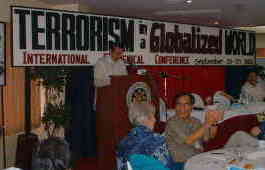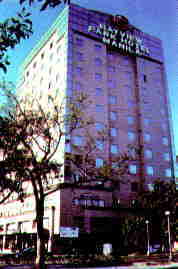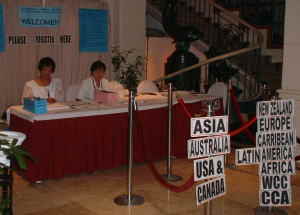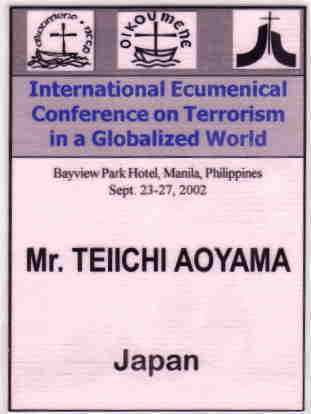|
Furthermore, the Philippines is the main U.S. ally in the ASEAN, whose
members are starting to show signs of an emerging independent foreign policy.
Indeed, the Philippines’ proximity to predominantly Muslim countries in
Southeast Asia, tagged by Bush as harboring terrorists, has bolstered fears
that the Philippines is being primed as springboard of aggression against
neighboring countries deemed less friendly to the U.S. Related to this
is the growing apprehension that the Philippines is becoming the new laboratory
for wars against terrorism.
Also on the drawing board is a series of even larger-scale joint RP-U.S.
military exercises in different parts of the country, where there are active
and long-running non-Muslim insurgencies. This has stoked fears not only
of intensifying Christian-Muslim conflicts but also of more flagrant U.S.
interventionism?abetted by the Philippine government no less?with great
potential for escalation of conflicts and violence.
In response to the increasingly critical situation in the Philippines
and Asia as a whole, the National Council of Churches in the Philippines
(NCCP), together with the World Council of Churches (WCC) and the Christian
Conference of Asia (CCA), is convening the International Ecumenical Conference
on Globalization and Terrorism in Manila on September 23-26, 2002. The
four-day conference shall address the theme, “Prospects for Peace and
Security in Asia and the Challenge of the Decade to Overcome Violence (The
Philippines as Case Study)”. The conference hopes to examine the interrelationships
of war, terrorism, peace and development, and globalization. It also aims
to strengthen the partnership of churches and people of various faiths,
cultures and ideologies to forge a common front in the global campaign
to expose the U.S.-led coalition on the war against terror. Also envisaged
is a series of pre-conference activities as part of the build-up to the
conference pro!
per and post-conference programs to follow through the results of the international
meeting.
B. Objectives of the International Conference
1. To gain a coherent understanding of the U.S. war on terror, its objectives
and scope as well as its effects on human rights and the rights of states,
including international conventions governing civilized conduct of war.
2. To share analysis on geopolitical trends in Asia in the wake of the
U.S. war on terrorism and in the context of globalization.
3. To stimulate theological reflection on the intertwined issues of globalization,
terrorism, peace and security amidst the reality of cultural pluralism
and worsening religious tensions in Asia-Pacific.
4. To promote international advocacy, networking and lobbying against U.S.
wars of aggression and more aggressive interventionism.
5. To draw up alternatives to violence and concrete programs on peace and
conflict resolution in the light of the ecumenical challenge of the Decade
to Overcome Violence.
6. To generate international awareness on and concerted response to escalating
violence and the deteriorating peace as well as human-rights situation
in the Philippines against the backdrop of growing U.S. military presence.
C. Proposed Program and Dates
1. As part of the build-up to the conference in the intermediate period,
a women’s international solidarity mission on the theme, “Voices of Women
to Overcome Violence” (18-22 September), which shall investigate the impact
of the military exercises and war effort on women, youth and children,
indigenous peoples as well as the environment.
2. A pre-conference exposure program for two days (20-22 Sept.) in Mindanao
and Central Luzon where joint military exercises are taking place.
3. Simultaneous with the exposure program, a half-day public forum featuring
a panel of eminent persons who will grace the conference (Sept. 21); and
another half-day roundtable discussion with Philippine church leaders and
theologians (Sept. 22).
4. A 4-day conference (Sept. 23-26) involving sharing of analysis on the
geopolitical situation in Asia-Pacific (covering the economic, politico-military,
and religio-cultural aspects of globalization), theological reflection
on the imperatives of the faith in the current geopolitical context, and
drawing up strategies and concrete proposals for action. The reports of
the women’s international solidarity mission and the exposure visits shall
likewise be received.
5. A post-conference audience with U.S. embassy officials (Sept. 27), during
which the conference statement and letter of concern shall be handed to
concerned parties by the conference leadership and team of eminent persons.
6. A post-conference audience with President Macapagal-Arroyo, Vice-President
Guingona and also possibly other government officials, legislators and
policymakers (Sept. 27).
7. Press conferences before and after the all-church women peace mission,
the exposure visits, and the conference proper. There shall also be press
coverage of the pre-conference public forum and roundtable discussion as
well as the post-conference dialogues. Effective media projection shall
be part of the build-up to the conference and shall be systematically planned
and undertaken all throughout the 7-day program.
D. Program Content of the Conference Proper
Among the major elements of the program are:
1. A keynote speech setting the tone of the conference and exploring the
theme, “Globalization and Terrorism: Prospects for Peace and Security
in Asia and the Challenge of the Decade to Overcome Violence”;
2. A report of the women’s international solidarity mission on the social
costs of the military exercises and the impact of the war effort on Filipino
women, youth and children; also on the indigenous peoples and the environment;
3. Reports on exposure visits to areas in Mindanao and Luzon where joint
R.P.-U.S. military exercises are being conducted.
4. An analysis of globalization, examining the nexus between globalization
and terrorism as well as the linkages between globalization in general
and global economic recession in particular, on the one hand, and the resurgence
of militarism and more aggressive U.S. interventionism, on the other.
5. An exploration of globalization’s political and military dimensions,
looking at the U.S. led coalition against terror, the impact of the war
in Afghanistan as well as the worsening Israeli-Palestinian conflict, and
changes in U.S. military strategy and foreign policy since the September
11 attacks;
6. An examination of dominant cultural and religious trends, dealing with
the widespread backlash against homogenization of culture, the rise of
religious fundamentalism, the resurgence of the religious right and the
use of religion to foment violent conflicts;
7. Panel presentations on the adverse consequences of globalization and
the prevailing geo-political realities in the sub-regions of Southeast
Asia, Northeast Asia and South Asia;
8. A reflection on the prospects for peace, security and human rights in
Asia, highlighting the case of the Philippines?dubbed by the media as the
new front of the war against terror?and reviewing the status of, and prospects
for, peace negotiations;
8. Workshops to deepen sharing of analysis, firm up unities, explore alternatives
and draw up common strategies; and,
9. A biblico-theological reflection summing up the issues raised in the
conference and the imperatives of the Christian faith in the present geopolitical
context.
E. Expected Results
1. A more coherent understanding of terrorism and an in-depth analysis
of current geopolitical realities and trends in Southeast Asia and Asia
as a whole in the context of ongoing globalization.
2. Closer cooperation between Protestants, Catholics, Muslims and people
of other faiths and ideologies around programs aimed at conflict prevention
or resolution and developing a culture of peace in line with the call of
the Decade to Overcome Violence.
3. Concerted international campaigns to counter the negative effects of
globalization and the resurgence of U.S. militarism, unilateralism and
interventionism.
4. Renewed and broadened international ecumenical solidarity network on
justice, peace and human rights.
5. More effective international projection of the people’s movement against
growing U.S. military presence in the Philippines with the end in view
of forestalling U.S. armed aggression and strengthening international solidarity
for peace based on justice.
6. A publication on the results of the conference (i.e., analytical studies,
theological papers, and creative alternatives) for wider currency and awareness-building.
F. Mechanics of the Conference
1. A small planning committee shall be organized drawn from the staff of
the WCC, CCA and NCCP. It shall meet in Hong Kong or Manila in June to
finalize the details of the program, draw up the list of resource persons
and participants, settle questions of accountability, and firm up financial
commitments/budget.
2. A special task force, to be coordinated by NCCP’s Consultant for International
Ministry, shall be created to serve as conference secretariat and to oversee
the preparations, including preparatory international travel to drum up
support for the conference, both in terms of funds and participation.
3. A host committee or list of local convenors in the Philippines shall
be organized, drawing participation from Protestant, Catholic, Muslim and
secular popular organizations.
23 September, Monday (Open Session)
9:00 Opening Act
・ Opening Worship
・ Message
BP. MANO RUMALSHAH (United Soc. for the Prop. Of the Gospel, U.K.)
・ Welcome Remarks
DR. DOMINGO DIEL (NCCP Chair)
10:00 Opening Addresses
DR. AHN JAE WOONG (General Secretary, CCA)
MR. CLEMENT JOHN (Programme Executive, Cluster on Relations, WCC)
MS. SHARON ROSE JOY RUIZ-DUREMDES (General Secretary, NCCP)
10:30 Break
11:00 Welcome Address
HON. TEOFISTO GUINGONA (Vice President of the Philippines)
 |
| Vice President of the Philippines |
11:30 Keynote Address
“Terrorism in a Globalized World: Prospects for Peace and Security
in Asia”
DR. NINAN KOSHY (Author, India)
12:30 Lunch
2:30 Introduction of Participants
MR. TONY WAWORUNTU (Secretary, International Affairs, CCA)
Orientation
MS. CARMENCITA KARAGDAG (Conference Coordinator)
3:00 Report of the Women’s International Peace Mission to the Philippines
DR. KATHRYN POETHIG (United States)
4:00 Break
4:30 Plenary Discussion
“The New World Order, the U.S. War on Terror and Other Conflicts”
Discussants:
MR. PAUL RENSHAW (United Kingdom)
MS. MOANA COLE (New Zealand)
MR. OYSTEIN TVETER (Karibu Foundation, Norway)
Moderator:
MR. ERICH WEINGARTNER (Canada)
6:30 End of Session
7:00 Welcome Dinner and Fellowship (to be hosted by heads of churches)
24 September, Tuesday
8:30 Morning Prayer and Reflection
MR. DAVID WILDMAN (Gen. Board of Global Ministries, U.S.A)
9:00 Input and Discussion
“Globalization: Concentrating the World’s Wealth and Power”
PROF. WILLIAM K. TABB (Professor, City University of New York)
10:30 Break
11:00 Panel Presentation
“A War to Refashion Regimes and Economies in Asia”
・ Japan and the Two Koreas: U.S. Allies and the “Axis of Evil’
・ China as a Perceived Threat to U.S. Dominance in the Region
DR. KIM YONG BOCK (APGSSL, Korea)
MR.VICTOR HSU (Church World Service, U.S.A.)
12:30 Lunch
2:00 Panel Discussion
・ South Asia: Dealing with Prolonged Internecine Conflicts and Nuclear
Threat
MR.LEMENT JOHN(Pakistan)
MS.NIMALKA FERNANDO(IMADR,Sri Lanka)
・ South East Asia:
DR. SORITUA NABABAN(Indonesia)
MR.JERALD JOSEPH(Malaysia)
“The Philippines in the Expanding Front of the U.S. War on Terror”
ATTY. ROMEO CAPULONG (Public Interest Law Center)
REP. SATUR OCAMPO (Bayan Muna Party)
4:00 Break
4:30“Globalization, Misery and Militarization in the Philippines”
Testimonies:
MS. ALMIRA ALI LIDASAN (Moro-Christian Peoples Alliance)
MS. MARIE HILAO (Karapatan)
MS. VICTORIA TAULI CORPUZ (Tebtebba Foundation)
Analysis
DR. EVERETT MENDOZA (Divinity School, Silliman University)
6:30 End of Session
25 September, Wednesday (Open Session)
9:00 Panel Presentation
“Cultural Homogenization, Religious Fundamentalism and
the Manipulation of Religious Symbols and Idioms”
MR.GABRIEL HABIB (Greek Orthodox Patriarchate of Antioch, Lebanon)
DR. EDWIN LESTER J. RUIZ (Prof. of Theol. and Culture, N.Y Theological
Seminary)
10:30 Break
11: 00 Panel Discussion
“The War on Terror and its Implications on Human Rights,
Civil Liberties and the Sovereignty of States”
DR. HANS KOECHLER (International Progress Organisation, Austria)
Reactors:
MS. IRIS ALMEIDA (Center for Rights and Democracy, Canada)
MR LOPETI SENITULI (Tonga Human Rights & Democracy Movement)
12:30 Lunch
2:00 Concluding Presentations
“Global Power: Examining the Nexus between Globalization and Terrorism”
DR. ALEJANDRO BENDANA (Historian, Nicaragua)
“Challenging the Global Power”
DR. FERNANDO ENNS (Ecumenical Inst., Univ. of Heidelberg, Germany)
REV. CHRIS FERGUSSON (Gen. Sec. Justice, Global and Ecumenical
Relations,
United Church of Canada)
4:00 Break
4:30 Workshops: What is to be done?
Distinct role of the churches and the ecumenical movement
A. Asian solidarity against threats to human security and state sovereignty
Resource Person & Facilitator:
B. Forging inter-faith solidarity in the midst of religious conflicts
Resource Person & Facilitator:
C. The Decade to Overcome Violence: refocusing on state violence and state
terrorism
D. Women: dismantling the patriarchal war machinery
E. Legislating the war on terror and upholding International Covenants
Resource Person & Facilitator:
F. Philippines: stopping the advance of the war on terror
7:00 Dinner
8:00 Continuation of Workshops (Optional)
9:30 End of Evening Session
26 September, Thursday
9:00 Continuation of Workshops
10:30 Break
11:00 Continuation of Workshops and Writing of Reports
12:30 Lunch
2:00 First Reading and Discussion of Draft Statement and Workshop Reports
4:00 Break
4:30 Closing Act
・ Approval of Draft Statement
Drafters: PROF. LUIS TEODORO (Philippines)
・ Presentation of Conference Resolutions
・ Words from Participants
・ Closing Remarks
6:30 End of Session
8:00 Solidarity Night
27 September, Friday
・ Press Conference
・ Audience with the Office of the President of the Philippines
・ Audience with U.S. embassy officials
・ Audience with Canadian embassy officials
・ Departures
|




